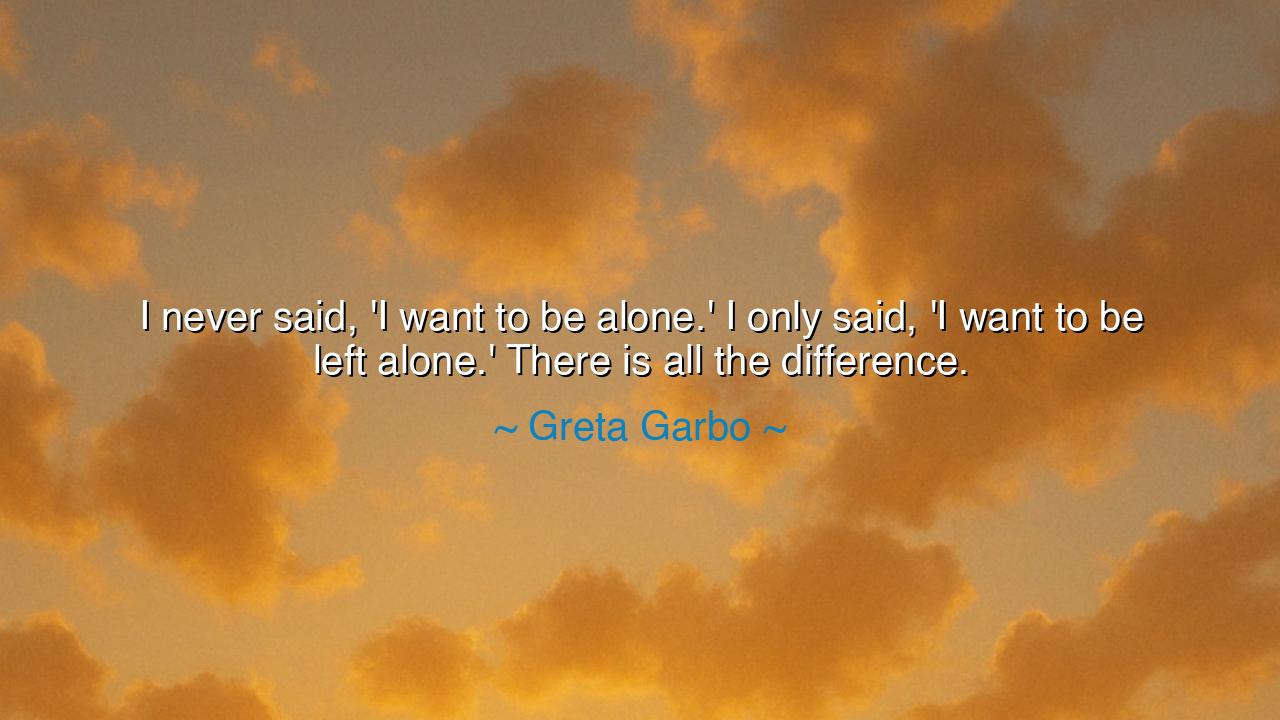
I never said, 'I want to be alone.' I only said, 'I want to be
I never said, 'I want to be alone.' I only said, 'I want to be left alone.' There is all the difference.






When Greta Garbo said, “I never said, ‘I want to be alone.’ I only said, ‘I want to be left alone.’ There is all the difference,” she spoke not only for herself, but for every soul who has ever sought peace without isolation, privacy without loneliness. In these few words lies a truth both simple and profound — that solitude and abandonment are not the same, and that there is a sacred dignity in the desire to withdraw from the noise of the world without severing one’s bond to it. Garbo’s distinction between being “alone” and being “left alone” is the difference between despair and serenity, between exile and freedom.
Garbo, one of the great icons of cinema’s golden age, became a symbol of mystery and quiet strength. The world saw her as distant, elusive, even cold — but what she truly sought was sanctuary. After years in the blinding light of fame, she longed for the soft shadows of ordinary life, a space where she could exist without performance. When she said she wished to be “left alone,” she was not rejecting the world — she was reclaiming herself from it. Her words are a defense of inner sovereignty, a reminder that to protect one’s spirit from constant exposure is not selfishness, but wisdom.
There is an ancient echo in her plea. The philosophers of old — from Diogenes who lived in his barrel, to Epicurus who taught his followers in a quiet garden — all sought refuge from the clamor of society, not because they hated people, but because they loved clarity. They understood that the soul cannot speak when it is drowned by the noise of others. To be “left alone,” then, is to listen again to one’s own voice, to rediscover the rhythm of thought and feeling that fame, duty, or distraction may have buried. Garbo’s statement is the modern echo of that timeless truth: the soul must sometimes retreat to remember who it is.
The origin of this quote lies in Garbo’s resistance to the public’s relentless fascination with her. As one of Hollywood’s most famous stars of the 1930s, she had been elevated to a near-mythic status, her every movement scrutinized, her every silence interpreted. When she withdrew from film at the height of her fame, the world called her reclusive. But her own words clarify the misunderstanding: she did not despise company — she despised intrusion. The desire to be “left alone” was not an escape from humanity, but a boundary against the endless hunger of the public gaze. It was the voice of a woman defending her right to peace in a world that would not stop watching.
We see this same yearning across the lives of those who have carried the heavy burden of public or moral labor. Emily Dickinson, the poet who rarely left her home, withdrew not from love but from distraction, creating an inner universe of words so vast that it outlived her silence. Nikola Tesla, too, retreated from social life, not because he rejected people, but because he needed solitude to conjure his inventions. Like Garbo, they were not seeking loneliness; they were guarding the flame of inspiration from the winds of interruption. For those who carry great intensity within them, solitude is not absence — it is preservation.
Garbo’s words teach us to recognize the sacred distinction between isolation and self-possession. To be alone is to be cut off, yearning for connection. But to be left alone is to be whole within oneself — connected to others not through proximity, but through understanding. The one who has learned to be left alone carries an inner calm that cannot be disturbed by the noise of the crowd. In this way, Garbo’s wisdom is not just for the famous or the weary; it is for anyone who lives in an age that demands constant visibility, constant noise, constant performance. To be “left alone” is to choose stillness in a world addicted to motion.
Let this be the lesson: guard your inner space as you would a sacred temple. Seek not to flee the world, but to walk within it without losing yourself. When you feel overwhelmed by voices, opinions, and expectations, withdraw for a while — not in anger, but in reverence. Sit in silence, close your eyes, and remember that the strength of the self grows in stillness. As Garbo knew, peace is not found in isolation, but in the freedom to choose when and how you engage with the world.
So, take her words to heart. When you say, “leave me alone,” mean not that you wish to vanish, but that you wish to return to yourself. For in the quiet sanctuary of being “left alone,” the soul does not grow cold — it grows clear. And from that clarity comes wisdom, balance, and the strength to face the world again — not as a performer for its approval, but as a sovereign being who belongs wholly to themselves.






AAdministratorAdministrator
Welcome, honored guests. Please leave a comment, we will respond soon